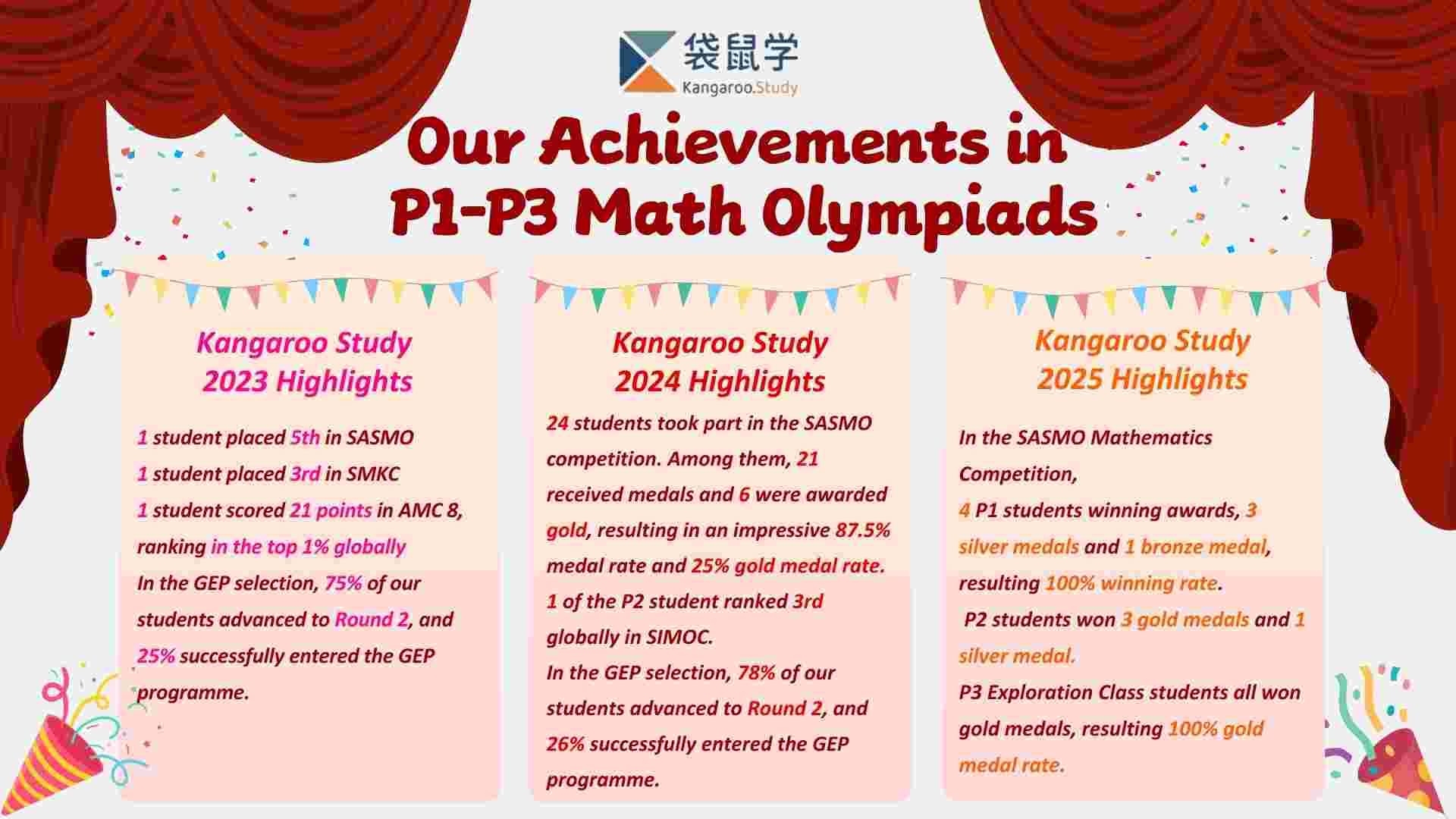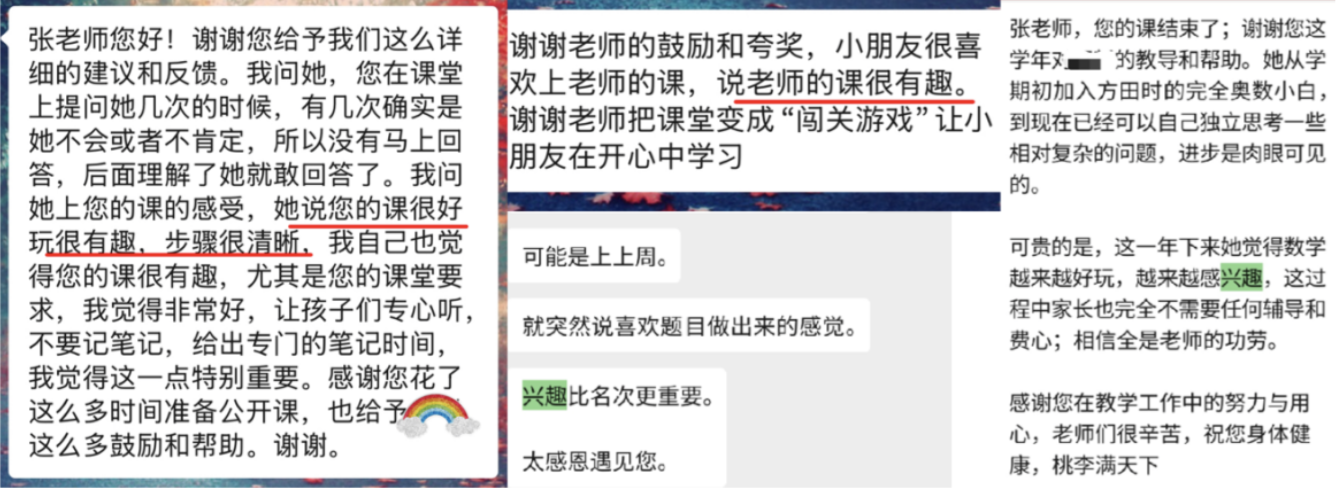本帖最后由 张涛老师 于 2025-11-20 00:29 编辑
P2-P3 | End of Year Holiday & Semester 1 Curriculum
As P2 students move toward the GEP selection year, many children and parents will face important questions: What exactly is tested in GEP Math? How should we plan ahead? When math becomes more systematic and challenging, how do we spark and sustain a child’s interest and motivation? If a child struggles with accuracy, carelessness, or independent learning, how can we build the right learning habits?
From our teachers’ perspective, these three areas are deeply interconnected. Only by nurturing knowledge, interest, and habits together can we truly build a strong and lasting foundation for a child’s mathematical development.
Why Parents Choose Kangaroo Study?
Since Kangaroo Study established its presence in Singapore, our lower primary students have consistently achieved outstanding results across various mathematics competitions for three consecutive years.
In this year’s SASMO competition, all four participating P1 students received awards, including three silver medals and one bronze medal, achieving a 100% award rate. P2 students secured three gold medals and one silver medal, while the P3 Exploration class achieved a remarkable clean sweep of gold medals, with a 100% gold rate.

What Will Students Learn?
1. How Do We Support Students Preparing for GEP? Comprehensive Coverage of GEP Exam Points
In response to the new GEP framework, Kangaroo Study has systematically organized 6 major modules and 40 core exam points that fully align with the reformed GEP Math requirements.
We also conducted an in-depth study of past exam papers, categorized the knowledge points by difficulty, and, based on students’ cognitive development patterns, reasonably broke them down and distributed them across the long-term P2 and P3 courses to help students prepare more effectively.
2. Interest Enlightenment — Guiding Children Toward a Sense of Achievement Many parents often say: “My child isn’t self-motivated — I have to keep pushing.”
“My child is afraid of difficult problems and lacks confidence.”
At the core of these issues lies one key factor — a lack of genuine interest. At Kangaroo Study, we believe true interest doesn’t come from external rewards, but from the sense of accomplishment that grows through learning. Our teachers use a guided learning approach, helping children learn how to think, not just what to do.
Instead of criticizing mistakes, we encourage effort, guide reflection, and help students find their own paths to the solution. When children experience those “I figured it out!” or “I found the pattern!” moments, learning becomes exciting, and confidence shines through. They begin to enjoy thinking and exploring, facing challenges with curiosity rather than fear.

This kind of learning not only builds ability, but transforms mathematics into a journey of discovery and joy.
3. Habit Enlightenment — From Being Pushed to Self-Driven Many children lose focus in class, make careless mistakes, or skip review altogether. The real cause isn’t ability — it’s the lack of strong learning habits. At Kangaroo Study, our teachers are not just knowledge instructors — they are also habit coaches. Through consistent guidance and feedback, good habits are built naturally into every stage of learning.
3.1. Listening Habits In class, we emphasize the “PSLE Listening Method”: “Put down your pen, sit up straight, and look at the teacher.” Teachers use questions, tone, and interaction to capture attention and help students stay focused and engaged, cultivating effective listening skills.

3.2. Problem-Solving Habits “Careless mistakes” usually come from weak comprehension, not poor calculation. Teachers model how to identify key information, highlight relational words (like more than, left, in total), and annotate the meaning of each step. Through a consistent cycle of teach → practice → check → feedback, students gradually turn structured problem-solving into a natural habit.
3.3. Review Habits Based on the forgetting curve, Kangaroo Math sets up a systematic review process: Lesson quiz → Redo examples → Explain one problem to parents → Daily mini practice → Monthly revision. This steady rhythm of reinforcement and reflection helps students develop true independence and self-management in learning.
Kangaroo Study's P2 Curriculum
Below are the syllabus for our end of holiday courses, as well as the curriculum for the first semester at the beginning of next year:
The learning schedule for each module is as follows:
(1) Word Problems – The Core Focus This is both the largest and most challenging component in GEP math, making up around 42% of test content. Many students struggle even to interpret the questions. At end of holiday, we start with average and unitary problems to build confidence and problemsolving habits. In Semester 1, we cover the Top 10 classic word problem types, identifying key features of each and building a complete framework for solving them systematically.
(2) Calculation – Strengthening Accuracy & Speed Solid integer calculation skills are essential before moving to fractions and decimals in P3. At end of holiday, we will master smart addition/subtraction and begin multidigit multiplication/division. Semester 1 we will focus on smart multiplication/division techniques to improve both speed and accuracy.
(3) Geometry – Breaking Through a Common Weakness Perimeter and area are recurring GEP challenges. At end of holiday, we will learn efficient perimeter-solving methods, including for irregular shapes. As for semester 1, we will deepen understanding of rectangle/square areas, with integrated problems involving both perimeter and area.
Course Outline
To ensure that children can make the most of their holiday time, our courses are scheduled in three separate sessions. Each session covers the same content, sostudents only need to enroll in one session without attending multiple times.
Below are our holiday course schedule and the schedule for the first semester at the beginning of next year.
End-of-Year Holiday Program

Semester 1 (P3 2026) – Starts Jan 9, once weekly
• Class Format: In-person • Location: #02-12, Grantral Mall, 601 MacPherson Road, 368242
• Class Size: Max 16 students
• Fees: S$120 per lesson
• End-of-Year: 10 lessons → S$1,200 • Semester 1: 16 lessons → S$1,920
Meet Our Teacher Tr. Zhang Tao is a S-level (highest) permanent instructor at Fangtian Education, Mr. Zhang became Deputy Head of Primary Math within his first year. He is well-versed in Olympiad math systems and competition question design. Many of his students have won gold medals in the Spring Cup (equivalent to RMO). In 2023, 75% of his students qualified for the GEP 2nd round, with 25% admitted into the program. In 2024, 87.5% of his students medaled in SASMO, with 25% winning gold.
Parents and students speak highly of Tr. Zhang Tao's teaching style.
How To Enroll? All students are required to complete a placement test before enrolling. This allows our team to assess the child’s current level and recommend the most suitable class.
Enrolment Process: 1. Book a placement test (based on your child’s needs) 2. Receive assessment results and class recommendation 3. Confirm time slot and teacher, complete registration and payment
Contact for Placement Test / Enquiries Please reach out via WhatsApp or WeChat to: Tr Zhang Tao
|